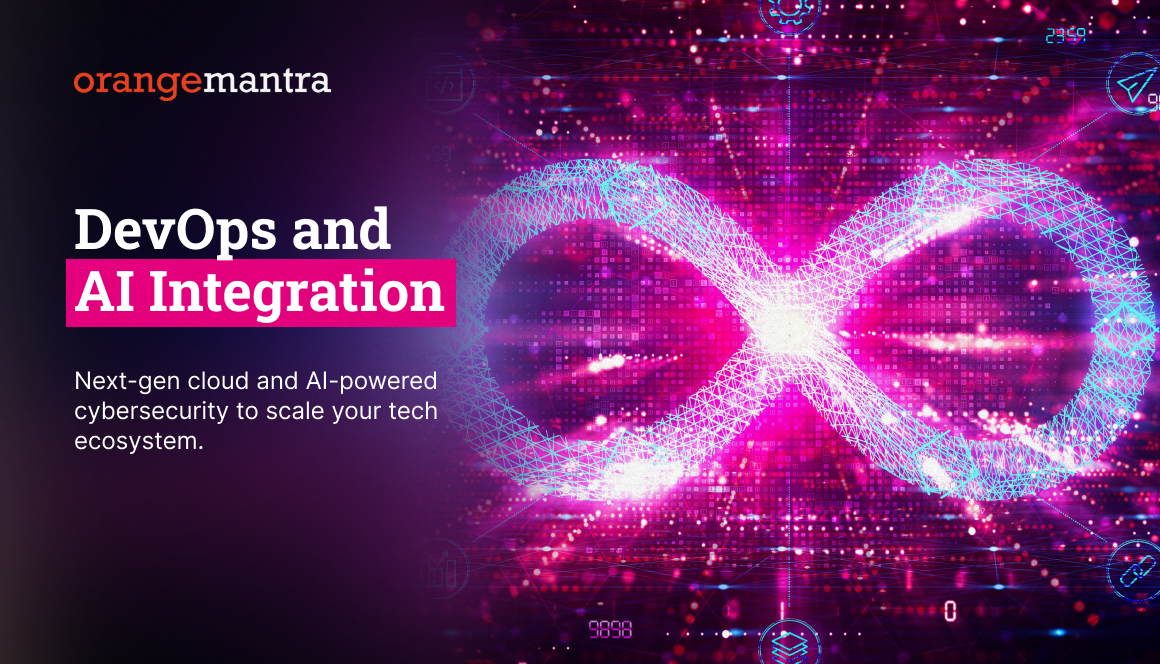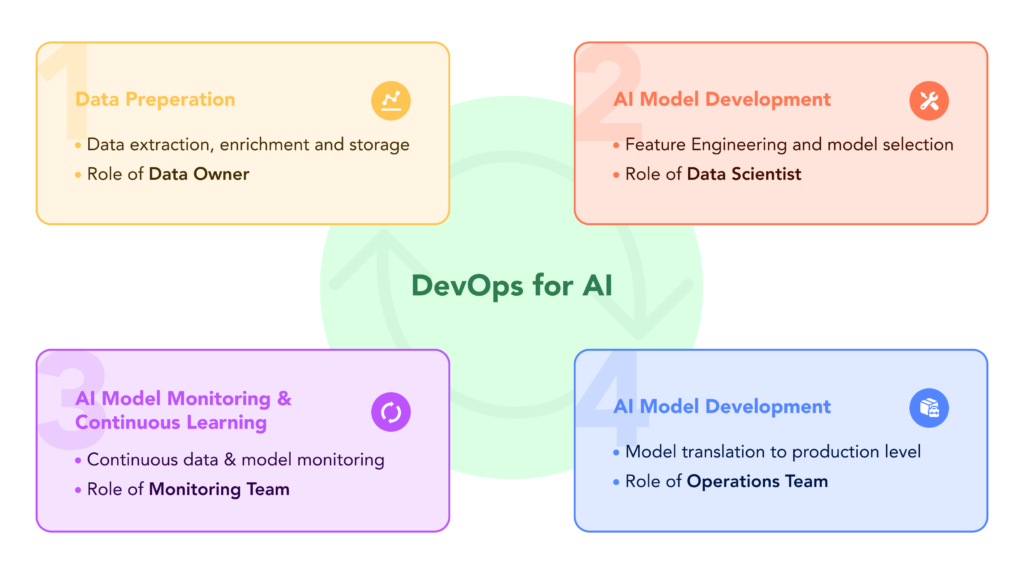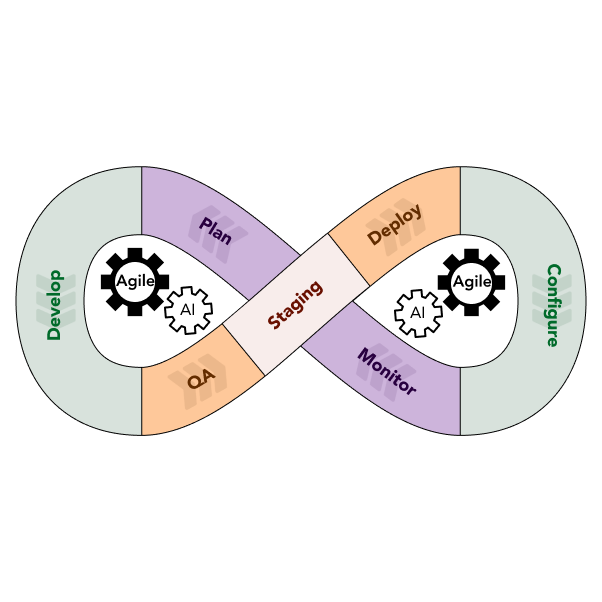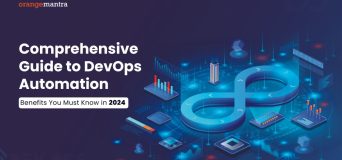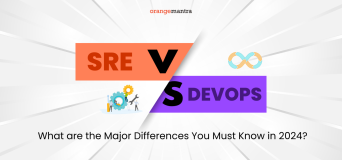Did you know what it takes to bring a powerful and effective transformation? Well, it’s a combination of speed, flexibility, scalability, and quality. As emerging DevOps trends redefine software development, companies are leveraging advanced capabilities to speed up their AI adoption.
There’s no doubt that artificial intelligence solutions have completely changed the traditional ways of business operations. From communication with customers through virtual assistants to process automation to network security management, AI has dramatically transformed how businesses operate today.
In 2021, we observed numerous new strategic priorities for organizations that needed to work to meet customer requirements. They were also seeking solutions to be more responsive, profitable, and quicker in decision-making. Organizations that can overcome challenges of adoption and distribution, and leverage AI and business automation tools to break these barriers will be able to deliver value to artificial intelligence in 2022.
Continuous Integration and Enhancements Scale AI Significantly
While several organizations have tried and tested new ways to achieve desired results in AI model creation, these best practices can help scale AI significantly.
- Integrating product development into IT operations (which is exactly what DevOps is all about)
- Focusing more on continuous delivery. Organizations can emphasize on process automation, continuous monitoring, and sharing of information and processes throughout the software development and IT operations.
In simple words, DevOps is an amalgamation of processes and culture that unifies the development and operation teams for a rapid software development process. As product development and testing take place simultaneously, it smoothens the development process and improves the scope of faster software updating and delivery.
DevOps as an Ongoing Process – An Infinite Loop of Improvements
DevOps ensure a faster software development process, minimum deployment failures, enhanced efficiency, and effective collaboration. Hence, other leading technologies need such an implementation to empower organizations to accelerate adoption.
Adopting any kind of change and innovation overnight is often opposed by people and systems. This is even more severe in the case of smart technologies.
Recently, IBM conducted a survey in partnership with Morning Consultant, “From Roadblock to Scale: The Global Sprint Towards AI”. The survey revealed that 78% of respondents face challenges in AI deployment.
As an organization, if you’re looking to leverage the benefits of AI and ML, you need to follow DevOps best practices to facilitate continuous integration, delivery, deployment, and monitoring. This powerful approach can significantly stabilize and streamline the AI model development process through CI (Continuous Integration) and CD (Continuous Deployment) principles. It can enhance ope-rationalization right from design to production, rapid implementation, and automation of these cutting-edge technologies.
How DevOps Best Practices Expedite AI Adoption
Organizations incorporating DevOps in AI for proper AI development processes and for the right time of execution enjoy the following benefits.
-
Speedy Development Process
Many companies are still new to AI development. And therefore, they need to build a testing environment first for such a new operation. However, deploying code to software and then running tests become a time-consuming and cumbersome process. That’s when DevOps comes to the rescue. It eliminates such time-consuming and tedious tasks while ensuring faster time-to-market.
-
Better Quality
Artificial intelligence greatly relies on the quality of data processed by them. AI models trained on low-quality data often generate skewed responses which lead to poor results. When structured data comes into the AI development process, DevOps help in cleaning datasets and enhances and enhances model quality.
-
Enhanced AI Scalability
Since AI has numerous roles and operations, scaling it becomes a major challenge. The DevOps process relieves AI with quick delivery, avoids rework, and enables teams to concentrate on the next step.
-
Ensures AI Stability
DevOps encompasses the process of continuous integration which prevents the release of faulty products. Hence, it facilitates the launch of an error-free model that is more stable and reliable.
How DevOps Culture Will Boost AI Performance
Artificial intelligence solutions have not only transformed several business processes but developed many. However, AI still faces challenges as it needs tremendous human efforts and technologies are emerging to overcome them. Hence, gaining a quality dataset, cleaning, and predicting become more complex. Besides, creating a seamless generalized training pattern, that is, bringing an exclusive technique from a specific scenario to the other is a different challenge.
To achieve exceptional results, businesses should consider transforming their operational processes, such as encouraging a DevOps culture. This approach can produce efficient development, deployment, and process pipeline.
As an organization, you can make AI processes adaptable to DevOps culture in the following phases:
-
AI Data Preparation
Preparing a quality dataset involves the process of transforming raw data, processing them through ML algorithms, and converting them into meaningful insights for predictions. While the steps for data preparation may vary according to industry, some basic phases involved are collecting, cleaning, transforming, and storing valuable data which is a time-consuming task for data scientists. To integrate DevOps into data processing, automating and streamlining the process is the only solution to manage this pipeline. This process is also termed “DevOps for Data” or “DataOps”.
DataOps leverages technology to automate the design, deployment, and management of quality data delivery. DevOps practices not only bring team support but also streamline the process of work delivery.
-
AI Model Development
One of the most challenging yet vital parts of AI/ML model creation is its effective development and deployment as well as keeping the environment functional and supportable. The team steering the entire development process should automate in development pipeline through methods for simultaneous development, testing, and model versioning.
Since AI and ML-based projects revolve around real-world use cases in real-time, teams must use frequent regular and small iterations during the development process and then implement them in the production process.
This involves following a CI/CD approach for AI/ML. And here’s how it works:
- AI/ML depends on experiments and iteration of models. And that’s why, it takes adequate time to develop, train, and test the model. So, it’s advisable to create an individual workflow and incorporate different timelines for developing and testing.
- It’s worth noting that it’s not a one-time development model. Rather, it is a continuously improving model designed to deliver value without compromising. Therefore, with the collaboration with the team to constantly enhance the practice, error checks can improve the AI model lifecycle and its advancement.
-
AI Model Deployment
DevOps practices make AI models modular and portable to manage incoming data streams in real time on highly distributed and scalable platforms. Such models can accelerate AI operations. However, as enterprises are involved in AI production, some of the common challenges that are likely to emerge include:
- Recording research and trials
- Maintaining traceability
- Making models searchable
- Visualizing model performances, and more.
To address these challenges, both DevOps and IT teams need effective collaboration i.e., they need vital store artifacts, and ML specialists need to rebuild the product model. Hence, it is important to ensure seamless teamwork amongst data scientists, IT, and DevOps teams.
In simple terms:
- DevOps team must constantly monitor the system for audits.
- Data scientists must monitor model degradation, testing, and other tasks, and collaborate with the DevOps team.
Machine Learning Operations (MLOps) is another technique for the culmination of people, operations, practices, and essential technologies that automate the implementation, monitoring, and management of AI/ML models under development in a fully controlled and scalable manner.
Establishing a solid MLOps foundation helps data development and production teams to collaborate and leverage intelligent automation. They can effectively deploy, track, manage, and administer services and ML initiatives within the organization, operation, and culture.
-
AI Model Monitoring and Learning
DevOps is a popular and widely used approach in the software development cycle. It is effective and enables teams to reduce development timelines and make releases faster and smoother. AI/ML models have the potential to generate predictive results that change, or “drift” from the initial parameters defined during the training period.
Identifying the drift category can help determine the remedial actions essential for bringing the forecast performance to an optimal level. DevOps comes with the concept of continuous learning to monitor drift and accuracy to remain relevant for the long term.
Of course, continuous improvement in DevOps demands a strong commitment to continuous learning and gaining expertise from the organization. Skills are needed to incorporate the implementation and functioning of advanced operating practices, continuous testing, and monitoring.
For continuous improvement and learning, organizations need to consider the following practices:
- Obtain continuous feedback from data scientists
- Ascertain and conduct training goals for every role in AI application.
- Set training goals for DevOps teams, data scientists, and IT leaders. Check if essential tools and resources are accessible to all teams.
AI launch involves the use of automation in a meaningful way, covering all business processes. Any model development process should be extensible and accessible to deliver greater value. A robust solution not only democratizes access but has also proved to be effective and flexible enough to support the business vision and goals.
Continuous Integration Can Accelerate AI Modeling
For most companies, the process of product development and implementation involves an iteration period in which all alterations are stopped. That is, no further development is allowed. Meanwhile, a different team should set up the supporting technology infrastructure, which takes only a few weeks. The updated version can be distributed once all the steps are completed.
However, the main problem with most companies is that they quit their AI development process. Hence, they are defeated by those who understand the significance of the scalability of technology and cultural practices.
Organizations can expand and create a fully automated AI model by combining DevOps culture and technologies. They need to focus on highly profitable automation opportunities to enhance efficiency and productivity.
To tap into these opportunities, developers must incorporate advanced automated testing in their IT architectures. While organizations can prepare to transform their AI development processes, continuous delivery is therefore essential. Continuous deployment boosts the speed of organizations to market quality solutions and services.
Development teams can quickly learn and make well-informed decisions based on data that impact development and performance.
Wrapping up
DevOps for AI, no doubt, is a promising solution for businesses looking to boost and improve Artificial Intelligence solutions, innovation, and intelligent automation. It not only accelerates data preparation and model development work but also ensures streamlined processes for AI scaling.
Despite its significant advantages, AI integration often gets unaddressed. Companies should consider making AI operationalization primary business goals.
We, at OrangeMantra, focus on DevOps practices and culture to speed up the development and modeling process for our global clients. You may get in touch with us to learn more about how we can help you evaluate and execute a complete AI lifecycle management, including other intelligent business automation solutions. Avail of our profitable DevOps services and solutions to improve collaboration in your business enterprise.
See How We Helped a Leading Entertainment Service Provider with Our Unmatched DevOps Solutions.
FAQs
1. What is a DevOps pipeline?
A DevOps pipeline is a collection of automated operations and tools that the software development and operations team access to compile, create, test, and deploy application code easily and quickly.
2. Is CI/CD a part of a DevOps strategy?
Continuous Integration (CI) and Continuous Deployment (CD) are the key pillars of a DevOps strategy. Both CI and CD bring the development and IT operations teams on the same ground to deploy software.
